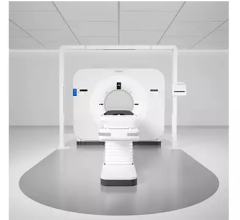
September 8, 2015 — Brainlab announced that its Automatic Brain Metastases Planning software has been used for the first time in the United States at Jefferson Hospital for Neuroscience in Philadelphia. The software was used to deliver a tailored radiosurgery treatment to a patient with cancer that has metastasized to the brain. The procedure, in which all five of the patient’s brain metastases were treated, took less than 20 minutes, including setup time using the Brainlab technology. Using the traditional method, it could have taken three hours or roughly 30 minutes per tumor.
When treating such patients, Automatic Brain Metastases Planning offers improvements over the current standard of whole brain radiation therapy (WBRT) treatment. WBRT involves applying low doses of radiation to the entire brain over time and with many sessions, which can lead to cognitive deficits. Automatic Brain Metastases Planning software can automatically render a clinically ready treatment plan typically in less than two minutes.
Using a unique dedicated algorithm, the Brainlab software allows delivery of highly conformal single-session treatments while helping to minimize dose spread to surrounding healthy tissue. By treating multiple brain metastases at one time, planning and treatment time can be significantly reduced, even with as many as 10 tumors to treat.
“In our first patient treatment, we targeted five metastatic brain tumors in one frameless treatment session,” commented David W. Andrews, M.D., professor in the Department of Neurosurgery, director of the Division of Neuro-oncologic Neurosurgery and Stereotactic Radiosurgery. “We will continue to use the Brainlab software with ExacTrac patient positioning and monitoring to efficiently and effectively treat up to 10 metastatic tumors at once, helping prevent unnecessary loss of brain function that can occur with whole brain radiation therapy, such as memory loss or other cognitive deficits.”
"With traditional stereotactic radiosurgery techniques, each metastasis is planned and treated individually, thereby increasing treatment time,” said Wenyin Shi, M.D., Ph.D., assistant professor of radiation oncology, medical director of radiation oncology at Jefferson Hospital for Neurosciences, and co-director of the Jefferson Brain Tumor Program. “The Brainlab software allows us to deliver a conformal cranial SRS plan with time-efficient precision targeting of several metastases in a single session.”
“Patients with diseases that cause brain lesions often require multiple treatments that are lengthy and cause discomfort. We are enthusiastic about any advances in practice that can limit the time a patient needs to undergo treatment and minimalize distress,” added Andrews.
Automatic Brain Metastases Planning is part of the Brainlab Elements a la carte software modules that support and facilitate neurosurgery and radiation oncology treatment planning.
For more information: www.brainlab.com


 December 11, 2025
December 11, 2025 









